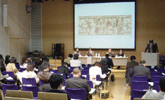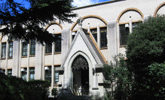Project outline / Plan / Research groups
Research topics and plans
■1 st Stage: The expansion of genocide research (the accumulation of individual empirical research).
◎ Common theme: “The reality of genocide”
◇ “European genocide”
◇
Armenian genocide
◇
Balkan genocide
◇
Genocide in Asia , Africa , North and South America and Oceania
◇
Genocide in East Asia and North East Asia
■ 2 nd Stage: The deepening of genocide research (association with modern thought, typology and comparison, mergers with neighbouring disciplines).
◎ Common theme: “Genocide and the modern world”
◇Modern thought and genocide
― Genocide and the principles of the people's state (populace and territory, ethnic self-determinism, racism, safety and welfare).
― Totalitarianism and genocide (Nazism, Stalinism, military dictatorships, dictatorships in developing countries).
― War and genocide (the dehumanization of the enemy, elimination of the “enemy”, anti-partisan fighting).
― Colonial rule and genocide (massacre of indigenous peoples, homogenization policies, economic exploitation).
◇The various forms of genocide
― Genocide perpetrated by groups other than nation states (Pogrom, civil unrest, ethnic cleansing, interaction between groups).
― Genocidal acts (attacks against political groups, forced migration, the borderline with war crimes).
― Cultural genocide (colonial rule, suppression of minority ethnic groups, coercion of lifestyle).
― Investigation into incidents of “forgotten genocide”.
― The discourse of genocide (propaganda and image, analysis of rumours).
― Genocide and human action (sexual violence, group psychology).
■3 rd Stage: The establishment of genocide research.
◎ Common theme: “Towards genocide prevention”
◇Social change before and after genocide.
◇The reconciliation process (reconstruction of social order, punishment and compensation, memory and symbolism, trauma).
◇Genocide and international politics (regional warfare, humanitarian intervention, theories of prevention).
◇Genocide and international law.
◇Anti-genocide education.
◇The role of governments and NGOs in genocide prevention.



